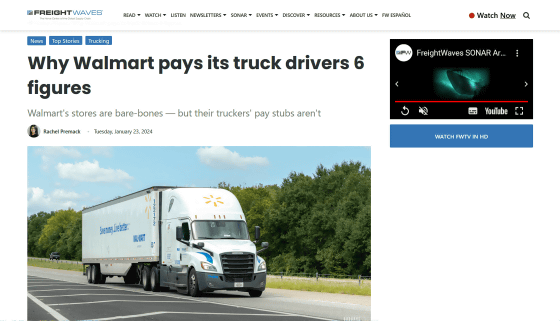Why does Walmart, the world's largest supermarket, offer high wages and comprehensive benefits to 'truck drivers'?

by
Walmart , the world's largest supermarket chain based in the United States, pays its truck drivers a high annual salary of up to $110,000 (approximately 16 million yen) from the first year of employment, and provides paid holidays and health insurance. We also offer welfare benefits. FreightWaves, a web media that deals with supply chains and logistics, explains why Walmart cares about truck drivers.
Why Walmart pays its truck drivers 6 figures - FreightWaves
https://www.freightwaves.com/news/how-walmart-uses-trucking-to-dominate-american-retail

Walmart is one of the best places to work for truck drivers in America, with annual salaries of up to $110,000 in the first year of employment, twice the average wage for truck drivers in the United States, and an hourly wage of $17.50 earned by the average Walmart employee. It is far more than the dollar (about 2600 yen). In addition, drivers are given time at home, paid vacation, and health insurance, which is a benefit rarely seen in the trucking industry.
The reason why Walmart values truck drivers so much is that Walmart has placed great importance on the 'supply chain' that transports products since its early days. Today, Walmart is the world's largest supermarket chain with annual sales exceeding $600 billion (approximately 90 trillion yen), but it opened its first store in rural Arkansas , and its existing trucking company He said he was reluctant to accept delivery orders.
Don Soderquist , an early Wal-Mart executive, said in a 1992 interview (PDF file) , ``We wanted to drive trucks 60 to 70 miles (approximately 96 km to 112 km) to the small towns where we operated. 'No one thought about it. We were completely ignored by shipping companies and wholesalers. So we ended up building our own distribution system.'

by
Walmart built a supply chain out of necessity, but its policy of emphasizing delivery made it possible to sufficiently distribute products even when building new stores in remote areas. As a result, Wal-Mart has succeeded in developing approximately 4,600 stores, far more than other retailers, while ensuring that its vast stores with a mix of groceries and miscellaneous goods are fully stocked.
For retailers, having products on the shelves is extremely important. In the first place, if there are no products on the shelf, customers will reduce the amount they buy, and if shortages become the norm, customers will end up going to another store. Delivering products safely and on time throughout the United States is the core of Wal-Mart's business, so it makes sense to pay large amounts to truck drivers who handle deliveries.
Journalist Charles Fishman, author of `` The Wal-Mart Effect ,'' a book about the local and global economic impact of Wal-Mart, says, ``Wal-Mart did what others were already doing.'' 'We became the biggest company in human history by doing it better than anyone else. Logistics and transportation are some of the things that make Walmart Walmart and allow us to compete.'

At the time of article creation, Walmart employs approximately 14,000 truck drivers, and that number has increased by approximately 5,800 over the past five years. In 2018, Walmart made changes to its truck driver recruitment program to help attract more drivers, and beginning in January 2023, Walmart employees will undergo 12 weeks of commercial driver license (CDL) training. A program for employees to apply has also been launched, and efforts are underway to train truck drivers within the company.
'We wanted to take advantage of the incredible talent pool of our employees and give them the opportunity to advance their careers,' a Walmart spokesperson said in a statement. This is a great opportunity,” he told FreightWaves. Internal applicants must also pass the same skills assessment as external hires, and then receive six weeks of ongoing training in partnership with a mentor.
Walmart's in-house training of truck drivers also prevents new truck driver hires from bringing in toxic cultures from outside the company. Brian Gibson , a supply chain researcher at Auburn University in the US, said: ``New drivers can be trained in the way the company wants, with the systems they need, and they can train the skills and competencies that are important to the organization.'' We can also focus on safety issues.”
Related Posts:







